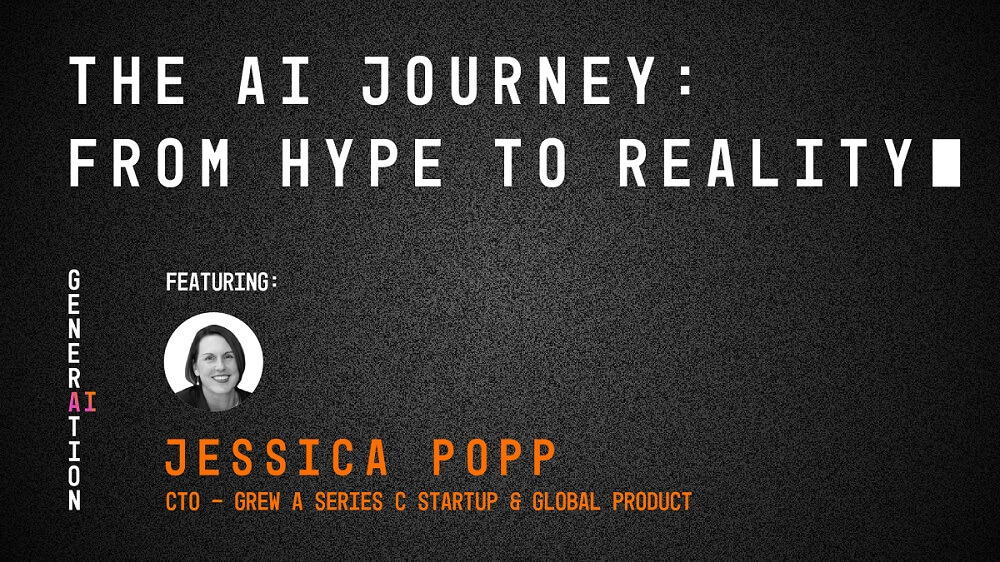PODCAST OVERVIEW
Navigating the AI revolution: From hype to reality
Learn how to decide what AI technology makes sense for your company with the latest episode on our Generation AI podcast
August 04, 2023 • 6 minutes

Everyone in the business world is buzzing about the AI revolution. From podcasts to LinkedIn statuses to boardroom meetings, it’s all the rage.
A short time ago, the AI models that are readily available today seemed like a distant futuristic (even dystopian) plot point. Seemingly overnight, AI has taken over the talk of the town. Should we be discussing AI chatbot worries and worst-case scenarios, or a bright future with even more jobs thanks to AI enhancements?
Jessica Popp is a self-proclaimed AI pragmatist. She has established herself as a proven Chief Technology Officer, exceeding expectations at many prolific positions with Intel, Twillo, and, most recently, Ada. A very results-oriented leader, she is known to accelerate project completion by nearly 90% and close team-identified incidents by over 600%.
Jessica joins us to discuss AI’s rapid rise to fame, what the focus should be today, and her vision of the AI-backed future.
Understanding the current AI ecosystem
Today’s tech tool landscape is overwhelming. Thousands of tools are available to add to your stack, many backed by various AI models. Narrowing down solutions from a list of thousands to find the perfect combination for your team can be quite the challenge, but not impossible, according to Jessica. Rather than looking for tools to completely overhaul existing systems, Jessica focuses on looking for AI that can enhance existing successful practices.
She looks for a few key points when analyzing new models. Those include:
- How will this model actually enhance existing systems?
- What effects on the software development lifecycle process does this model bring?
- How can this create more accuracy?
- Will this model make us more efficient?
- Can we prove this will reduce the toil experienced by the engineering team?
In today’s landscape, Jessica believes that many AI models will serve most of these functions. “I don’t think they can replace the developer,” Jessica says. “It should be more about creating more efficiency in what we’re doing.”
As a realist, Jessica understands concerns over the potential of accidental data leakages. Particularly on the business scale, inputting IP information into a prompt could lead to human eyes finding confidential information during reinforcement learning. This fear is not far-fetched. In fact, this exact thing has already happened.
At the same time, she believes the benefits of AI are plentiful and typically outweigh the risks.
“I encourage people to jump into AI with both feet — but they should thoroughly analyze their risk profile first,” Jessica says.
The pros and cons of open-source AI
AI models that use open-source, meaning they train their models on large corpora of data from the internet, are under scrutiny for a plethora of reasons. The owners of these corpora of data believe that AI models are making money solely off of their backs, and that the data is being obtained unfairly.
Jessica’s opinion is a little different, however.
“If humans can use this data to learn and advance, there’s no harm, no foul if AI does the same. (But) this does create a new, open-ended question,” Jessica says.
The challenge of bias in AI models
Everyone can agree that significant bias exists in the extremely large amount of data available on the open internet. The majority of the data available represents certain cultures and viewpoints significantly more than others. If hate speech or bias is prevalent in the input data, the AI model will take it as fact.
Even if it is not overt hate speech or bias, unconscious bias exists as well, and when models are trained on data with an unconscious bias, this bias prevails. Ultimately, this will be even more tricky to combat, as it will require in-depth research, study, and vigilance to prevent models from accepting nuanced bias as a foundation.
Breaking through the hype in the AI revolution
“I do get a little frustrated with the hype, but it’s not against AI. We’re a hype culture,” Jessica says. “Whatever the bright, shiny object is, there’s going to be hype about it.”
Jessica is excited about where the research is heading, but she cautions that we should not put the cart before the horse. “I’d like to pay less attention to the 20-year outlook where every person is a prompt engineer,” Jessica says. “What can I actually do with it today? What toil or risk areas can I address?”
There are still many in the field that do not trust AI, simply because it is non-human. Additionally, there is a field of thought that humans are significantly smarter than current reasonably available models. Jessica encourages getting your team to accept that as fact, round the learning curve, and prepare for adoption.
Instead of rebuking or idolizing AI for what it could be, it is pertinent to make it into something. Exactly like a business case, it is necessary to try out the newly available tools, then conduct A/B testing.
Jessica encourages asking questions such as:
- Did we absolutely love this tool?
- Did it change anything?
- How accurate is it?
- Did it impact ROI, either decreasing or increasing it?
- Does it meet the acceptance criteria?
If the tool did not bring any improvements to the table, we have to remember that this is the dawn of AI. It could be perfected soon, but it may not be a great investment of resources today. Remember to note promising technologies and circle back around regularly to check for application progress.
The downside of AI buzzwords
During the AI craze, it is readily apparent that no one wants to be left behind when the ship sails. The large amount of buzzwords and instant interest created has sent many people and companies into a frenzy.
“I would encourage purchasers in the near future, 18 to 24 months, to be more involved in what they are buying,” Jessica says.
With the urgency to be involved in the conversation, Jessica pumps the brakes on buzzwords. Instead, she insists upon continuous ROI evaluations, ensuring the value remains more prominent than the hype alone.
How AI amplifies the human experience
In high-touch experiences with end-users, humans will always be involved. AI could help to offload mundane tasks and create more free resources to build meaningful, elegant, and personalized experiences. In fields such as customer care and experience, AI could manage the technical side, while humans can work to create and retain happy, satisfied customers.
In the past five years, large language models, or LLMs, have moved extremely quickly, backed by rampant support (and the funding that accompanies it). Generative AI and LLMs are a huge initial investment, and in such a short time, we have moved from button-pressing in phone trees to adaptable speech-enabled responses. Jessica believes this is the most surprising stitch in the quilt of the AI journey.
“LLMs have become very powerful very quickly,” Jessica says. “We moved from ‘push one, push two’, and now I can have it write a sonnet about me. I don’t even remember what a sonnet is, but I could have one in just a few minutes. I think that is a big leap forward.”
More models, more solutions
Going forward, Jessica expects even more models to hit the market — and for good cause.
“I think a zoo of models, if we’re talking about an open-source model, is a good thing,” she says.
With intense worry about nefarious things that may happen with AI models, testing new ones against each other for bias could be the kickstart models need. Eventually, buyer personas will want to see statistics to understand the model, looking for proof indicating both a complete lack of bias and an undeniable force of good.
Does the current state (and future) of the AI revolution scare or excite you?
Subscribe to the Generation AI podcast to catch all episodes, then explore how LivePerson customers enhance the human intelligence of agents with Conversational AI tools to great success.

